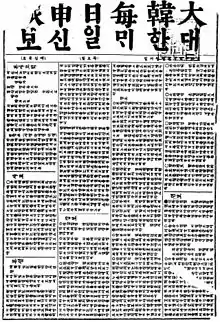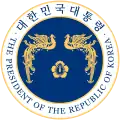Yang Gi-tak
Yang Gi-tak (Korean: 양기탁; April 2, 1871 – April 20, 1938) was one of the leaders of Korean independence movement who served as the 9th president of the Provisional Government of the Republic of Korea from 1933 to 1935.
Yang Gi-tak 양기탁 | |
|---|---|
_Prison_Record_(1919)_(cropped).jpg.webp) Yang in a Japanese prison photo (May 30, 1919) | |
| 4th President of the Provisional Government of the Republic of Korea | |
| In office January, 1926 – April 29, 1926 | |
| Preceded by | Yi Sang-ryong |
| Succeeded by | Yi Dongnyeong |
| Vice President of the Provisional Government of the Republic of Korea | |
| In office October, 1933 – October, 1935 | |
| Preceded by | Kim Ku |
| Succeeded by | Ryu Dong-ryeol |
| Personal details | |
| Born | April 2, 1871 Kangsŏ, P'yŏngan-do, Joseon |
| Died | April 20, 1938 (aged 67) Jiangsu, China |
| Nationality | Korean |
| Korean name | |
| Hangul | |
| Hanja | |
| Revised Romanization | Yang Gi-tak |
| McCune–Reischauer | Yang Kit'ak |
| Art name | |
| Hangul | |
| Hanja | |
| Revised Romanization | Ugang |
| McCune–Reischauer | Ugang |
Korea Daily News

Korea Daily News - Front Page
In 1904, Yang and British journalist Ernest Bethell first published Daehan Maeil Sinbo (대한매일신보), the newspaper which took an antagonistic views about Japanese reign. The paper illuminated many Koreans who were unaware of the problem, and also played a key role in leading the National Debt Repayment Movement.
New People's Association
In 1907, Yang played a key role in organizing the New People's Association (Korean: 신민회; Hanja: 新民會; RR: Sinminhoe) to promote industry and Korean independence.[1]
Notes
- Carter J. Eckert, Ki-baik Lee, Young Ick Lew, Michael Robinson, and Edward W. Wagner, Korea Old and New: A History (Seoul: Ilchokak / Korea Institute, Harvard University, 1990), 246.
This article is issued from Wikipedia. The text is licensed under Creative Commons - Attribution - Sharealike. Additional terms may apply for the media files.

